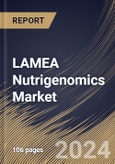In weight management, it provides insights into how genetic factors influence an individual's response to different diets and exercise regimens. This personalized approach to weight management aims to enhance the effectiveness of interventions, considering factors such as metabolism, appetite regulation, and fat storage. Athletes and fitness enthusiasts increasingly turn to Nutritional genomics to unlock peak performance secrets. Tailoring nutrition plans based on genetic factors related to muscle recovery, energy metabolism, and nutrient utilization can potentially enhance training outcomes and reduce the risk of injuries.
Furthermore, the market is characterized by dynamism, with ongoing trends reflecting technological advancements, research, and consumer preferences. These trends shape the market's trajectory and indicate the direction in which nutrigenomics is evolving as a transformative force in the realm of personalized nutrition. One notable trend in the market is integrating artificial intelligence (AI) for more sophisticated data analysis. AI algorithms interpret complex genetic data, allowing more nuanced and accurate insights into gene-nutrient interactions. This technology enhances the precision of personalized nutrition recommendations and facilitates handling vast datasets generated by genetic testing.
The UAE has witnessed a significant increase in obesity rates over the years, which can be attributed to factors such as sedentary lifestyles, unhealthy dietary habits, and the prevalence of processed foods. It allows for developing personalized nutrition plans based on an individual's genetic profile. Considering the diverse population in the UAE, personalized dietary recommendations can help combat obesity by optimizing nutrient intake, managing weight, and reducing the risk of obesity-related health issues. As per the data released by the United Arab Emirates Ministry of Climate Change & Environment, in the UAE, almost 70 percent of adults are overweight, and 28 percent are obese, with childhood obesity rising per global trends. Thus, rising obesity numbers in LAMEA region is expected to boost the demand for Nutritional genomics in the region.
The Brazil market dominated the LAMEA Nutrigenomics Market by Country in 2022, and would continue to be a dominant market till 2030; thereby, achieving a market value of $31.5 Million by 2030, growing at a CAGR of 17.1 % during the forecast period. The Argentina market is expected to witness a CAGR of 19.2% during (2023 - 2030). Additionally, The UAE market is expected to witness a CAGR of 17.9% during (2023 - 2030).
Based on Product, the market is segmented into Reagents & Kits, and Services. Based on End User, the market is segmented into Hospitals & Clinics, Online Platforms, and Others. Based on Application, the market is segmented into Obesity, Diabetes, Cardiovascular Diseases, and Cancer Research. Based on countries, the market is segmented into Brazil, Argentina, UAE, Saudi Arabia, South Africa, Nigeria, and Rest of LAMEA.
List of Key Companies Profiled
- Genova Diagnostics
- Metagenics, Inc.
- Nutrigenomix Inc.
- Unilever PLC
- The Gene Box
- Cura Integrative Medicine
- Fagron Genomics S.L.U. (GX Sciences Inc.)
- Xcode Life Sciences Private Limited
- DNA Life
- BASF SE
Market Report Segmentation
By Product- Reagents & Kits
- Services
- Hospitals & Clinics
- Online Platforms
- Others
- Obesity
- Diabetes
- Cardiovascular Diseases
- Cancer Research
- Brazil
- Argentina
- UAE
- Saudi Arabia
- South Africa
- Nigeria
- Rest of LAMEA
Table of Contents
Companies Mentioned
- Genova Diagnostics
- Metagenics, Inc.
- Nutrigenomix Inc.
- Unilever PLC
- The Gene Box
- Cura Integrative Medicine
- Fagron Genomics S.L.U. (GX Sciences Inc.)
- Xcode Life Sciences Private Limited
- DNA Life
- BASF SE








